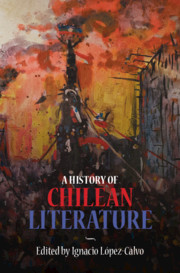Book contents
- A History of Chilean Literature
- A History of Chilean Literature
- Copyright page
- Dedication
- Contents
- Figures
- Contributors
- Acknowledgments
- Introduction
- Part I Proto-Chilean, Colonial Chronicles and Letters
- Part II Nineteenth-Century Articulations of an Embryonic National Consciousness
- Part III Beyond Chileanness: Heterogeneity and Transculturation in Canonical and Peripheral Twentieth- and Twenty-First-Century Literature
- Index
- References
Introduction
Published online by Cambridge University Press: 27 September 2021
- A History of Chilean Literature
- A History of Chilean Literature
- Copyright page
- Dedication
- Contents
- Figures
- Contributors
- Acknowledgments
- Introduction
- Part I Proto-Chilean, Colonial Chronicles and Letters
- Part II Nineteenth-Century Articulations of an Embryonic National Consciousness
- Part III Beyond Chileanness: Heterogeneity and Transculturation in Canonical and Peripheral Twentieth- and Twenty-First-Century Literature
- Index
- References
Summary
Roberto Bolaño’s Los detectives salvajes (The Savage Detectives, 1998) restored Chilean literature to its glory days. Not since Gabriela Mistral and Pablo Neruda won the Nobel Prize for Literature in 1945 and 1971, respectively, had a Chilean writer reached such prominence. Bolaño’s writing is internationally known, as evidenced by the 2018 documentary Los desiertos de Sonora (The Deserts of Sonora), a Spanish-Mexican coproduction in which characters of Los detectives salvajes are included. With the 2007 English translation of Los detectives salvajes, the Bolaño craze spread to all the English-speaking world. Such attention significantly increased his readership as well as critical studies on contemporary Chilean literature.
- Type
- Chapter
- Information
- A History of Chilean Literature , pp. 1 - 22Publisher: Cambridge University PressPrint publication year: 2021
References
Works Cited
- 2
- Cited by



